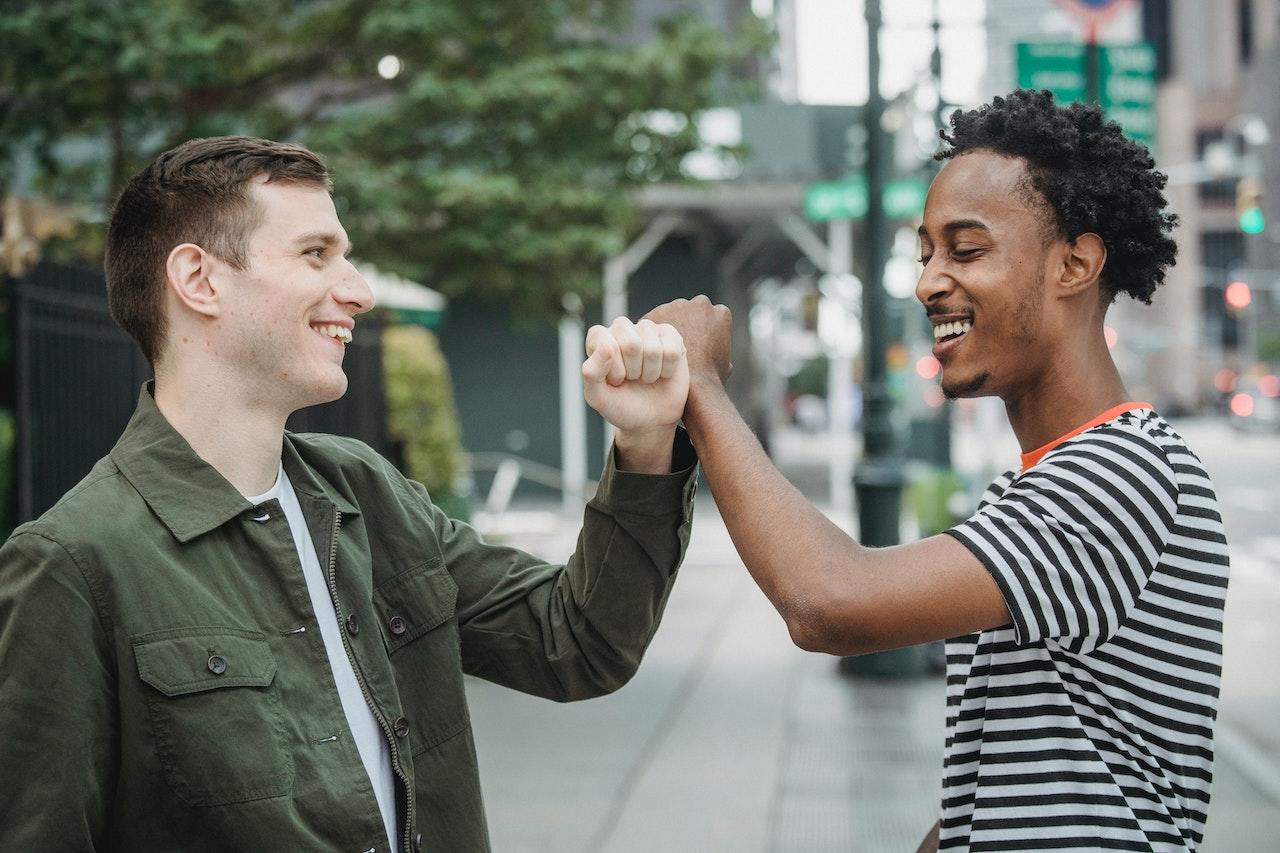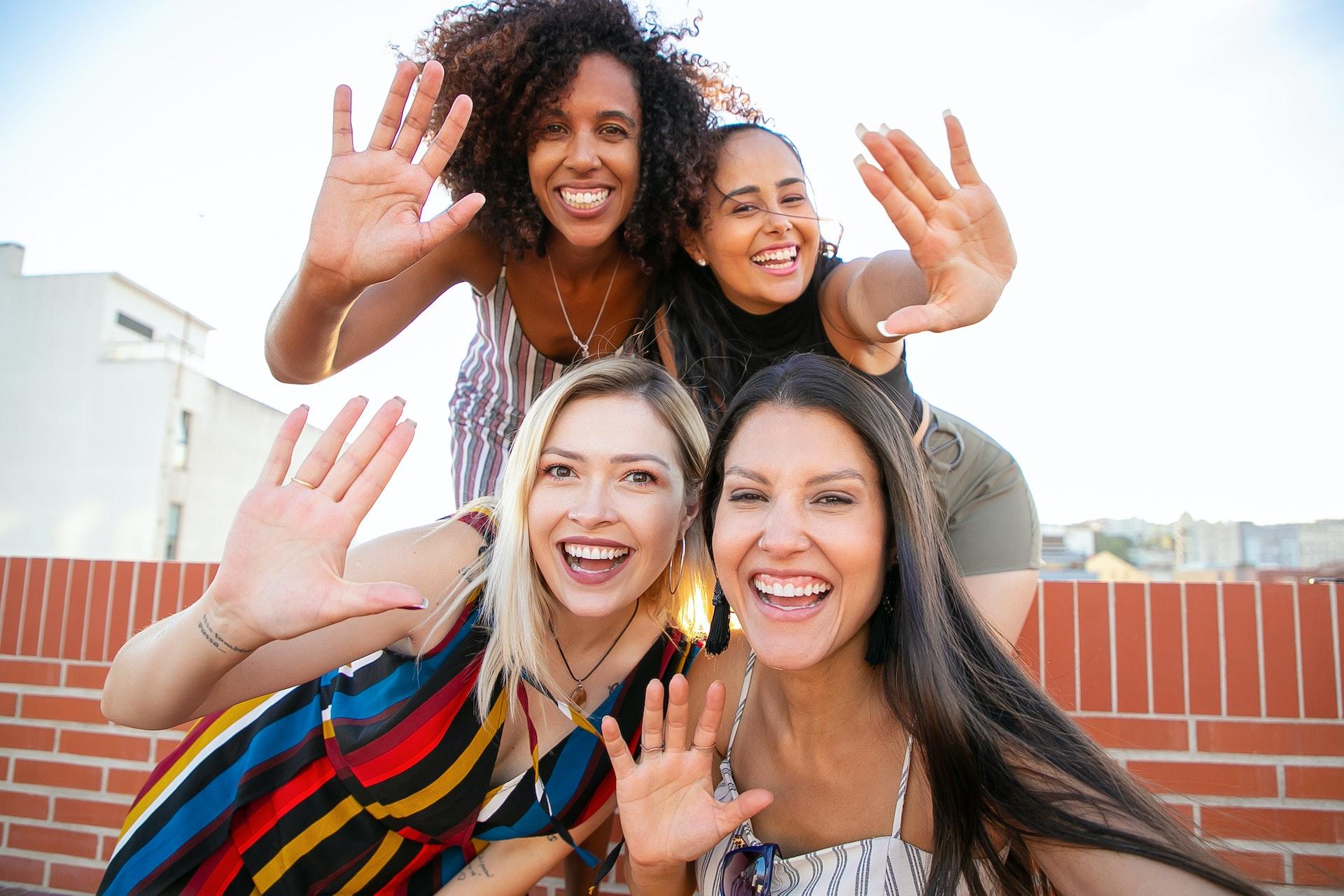Even if you don’t know a lot of English or are worried about your pronunciation, you can’t go wrong with knowing a handful of different ways to say “hello!”
The vast majority of English speakers will appreciate your effort to connect, and it’s fun to use interesting words in your everyday vocabulary, too.
You’ll frequently hear English speakers in North America and in Europe sprinkle their speech with words like “bonjour” and “scuzzi,” just to stay playful and keep from being monotonous. Not to mention regional dialects within English-speaking countries.
Here, you’ll learn 26 different ways to say English greetings (formal and informal). So spruce up your conversational English and have some fun with the most basic part of any interaction!

Formal Greetings
Firstly, it’s important to know how to greet people formally.
If you enter a formal situation and act too casual, it can make people feel you don’t quite understand what’s going on, leading to them thinking you are ignorant. It could even cost you a job in certain settings.
You can always use a formal greeting no matter who you are talking to, even if it’s people you’re close to. So if you can only learn a few words right now, make sure these are the ones you remember.
1. Good Morning / Good Afternoon / Good Evening
Probably the most helpful phrases you can learn after “Hello” are these ones. They are very polite and show that you are in a good mood and wish a good day on the person you’re greeting as well.
For example,
Hello, Good evening time? ❌
Good Morning, Mr. John Doe 🙌🏻
Hello, Good Evening, how are you? ✔
Hello, Mr. John Wick, hope you doing well. ✅
It’s often used in an office setting, or when you meet an employee at a business.
Learn English greetings and more in Mumbai from a mumbai english teacher.
2. Nice To Meet You / Pleased To Meet You
If you’re meeting someone for the first time, it’s always good to use one of these phrases. Even if they are a friend-of-a-friend, making a good first impression is important.
These phrases help break the ice between you, help you each remember each other’s names, and help establish a connection. It’s almost always accompanied by a handshake unless you’re not able to, for example, if you’re on a video call or if someone’s hands aren’t free. In that case, give a little downward head nod like a mini Japanese bow.
For instance,
Hello, It's really nice to meet you 💪🏽
Hi, Pleased to meet you 🤩
3. Hello, Thank You For Meeting With Me
This is the perfect phrase to use in instances like meeting someone for an interview. It shows that you are polite and recognize that the person you’re meeting with is gracious.
In job interviews, it’s best to be ultra-polite since it demonstrates that you will be a respectful member of the team if you are hired.
4. How Are You?
While it’s a (correct) stereotype that English speakers frequently ask this question without really caring about the answer, it’s still a good phrase to know.
It’s polite and its purpose is basically just to establish a connection with whoever you’re talking to. Expect the other person to say something like “Good, you?” And you can just reply with “I’m good,” or “I’m alright.” To keep the conversation going.
You could also reply with “Can’t complain,” or “Could be better, could be worse,” to indicate that your life has been boring but fine lately.
If you want to talk to this person about something that’s bothering you, say “I’ve been better.”
5. How Have You Been?
If you haven’t seen someone in a while (for example, more than 3 months), use this phrase to simultaneously acknowledge the time that has passed since you last spoke and give them a chance to update you on any important life events.
While this phrase is very similar to “How are you,” typically in this case, people are expected to give a small summary of how their life has been going so you can catch up with each other.
They might tell you about their children, a wedding that took place, a job change, a big trip, or other interesting and pleasant things like that. You can tell them something similar in exchange.
It’s also important to note that people often say this after knowing the person has been through a difficult time, like a divorce or death in the family. It’s a gentle way of asking that person if they have anything they want to get off their chest.
Improve your pronunciation with courses in spoken English near me.

Most Common Formal Greetings
When you’re writing a letter, the convention for starting the conversation is very different than when you’re speaking, especially in a formal situation.
If you’re writing a letter, email, or text to friends, you can say whatever you’d like to get the conversation started.
But when you’re writing to a professional, whether it’s an employer, a potential employer, someone you don’t know very well, or any other situation where formality is important, you’ll want to make sure you use the right introduction.
6. Dear Sir or Madam
If you know that you are writing to a specific person or department, for example, the customer service department, the head of marketing, etc, then use this phrase if you don’t know exactly who that person is.
In the heading of the letter, you’ll want to indicate the intended recipient. For example, you would write
XYZ Company
Marketing Manager
12345 , MG Road, India
7. To Whom It May Concern
If you really aren’t sure who will be receiving the letter or handling the response, you can simply put this phrase.
For example:
🙌🏻 You are sending a letter to the Electricity department but don't know who might receive it.
8. Dear Mr / Miss / Mrs / Ms / Prof / Dr ___
If you do know the name of the person you are writing to, be sure to write it in the most formal way possible. Use their title, and in the event that the person you’re writing to uses unconventional pronouns, be sure to respect that!
In that case, you will want to see if you can find out from LinkedIn, Facebook, or a mutual contact which honorific or title that person prefers using, such as Mx, M, Msr, Mys, Ser, or Sai.
If there is any confusion on the gender of this person, use their work title instead (such as IT Manager), or stick with “To Whom It May Concern.”
Wait, are you looking for private Spoken English classes in Coimbatore? Then, find an English teacher in 3 simple clicks.


Informal Greetings
Informal greetings are what you can use most of the time. Anytime you talk to a stranger, acquaintance, or friend, you can use any of these greetings! They are also appropriate for work if you have been in the position for a while (usually longer than 2 weeks).
Join English speaking classes in Nagpur and become a fluent English speaker in a few months!
English speakers enjoy using more casual greetings when appropriate because it helps make the environment feel more relaxed and builds camaraderie. You’ll be seen as more approachable and friendly when you switch to informal greetings with your office mates.
9. Hi / Hey
Short, sweet, and simple. You can say “hi” or “hey” in passing, or to start a conversation with just about anyone.
10. Beautiful Weather We’re Having! / Some Weather We’re Having!
Similar to “How are you?” this phrase is sort of just used to break the tension. If you want to indulge and talk about the weather (which is the best thing to talk about with strangers because you can always agree on it) you can, but if you don’t want to talk, you can just say “Sure is!” and continue on your way.
When you say it, you are giving the other person the same chance to either talk with you or not, but either way you’re announcing your presence.
11. What’s Up? / How’s It Going?
Usually, when you ask “what’s up?” or “how’s it going?” you actually do care about the response at least a little bit.
It can mean “how are you doing / feeling?” or it can mean “what are you doing right now?” depending on the situation.
12. What’s New?
Similar to “What’s up,” and “How have you been?” this greeting is an opportunity for the other person to fill you in on things going on in their life. It’s usually a good opening question to begin an interesting back-and-forth chat and can lead to fun, meandering conversations.
13. Good To See You
When greeting someone you haven’t seen in a while or someone you didn’t expect to see, this is the perfect phrase.
Say you’re at a restaurant and as you’re leaving, your coworker is just coming in the door. You could say “Oh my gosh! What are you doing here? Good to see you!” and wish them a good dinner, maybe give a small hug if appropriate, and then go your separate ways.
"Wherever we travel to, the wonderful people we meet become our family." - Lailah Gifty Akita
14. Long Time, No See
You can use this phrase to, confusingly, mean two opposite things.
Either you truly haven’t seen this person in a long time and you say this phrase to acknowledge how long it’s been, or you just saw this person and you’re joking about it being a long time since you last met.
15. Howdy
In the Southern part of the US, people tend to say this word seriously. In other parts of North America, it can be said in a casual, joking manner.
It’s short for “how do you do?” and is used just like “hello.” The typical response is another “howdy” and perhaps a nod of the head or a tip of the cap.
16. Hey Y’all
Another Southern phrase, “hey y’all” has been catching on in other places as well because it encompasses all genders. It’s also another way to sound fun and relaxed (especially if you’re not in the South).
17. Morning / Afternoon / Evening / G’morning / G’day
This shortened version of “good morning, etc” is how you can show respect while still remaining casual.
Of course, you’ll typically only hear people saying “G’day” in Australia and New Zealand!

Greetings for Friends
This is probably the most fun category of greeting.
As mentioned before, English speakers love having fun with being casual when they can. If you want to try to get someone to laugh or give you a fist bump, try using these greetings!
18. What’s Up / Sup / Wazzup
Super casual and light, use “what’s up” and “sup” as the full greeting to your friends before moving on to the bigger conversation.
If you really want to elicit a laugh, try saying “WAZZUUUUUP” a la this iconic Budweiser commercial which went viral before viral was even a thing (1999 to 2002).
19. You Alright?
This stereotypically UK English phrase is the most casual way of saying “how are you?” And just like “how are you?” you are’t really asking about their wellbeing at all, you’re simply acknowledging that you are in each others’ presences.
20. What’s Crackin’? / What’s Cookin,’ Good Lookin’? / What’s Shakin’, Bacon?
Slangy and snappy and designed to make someone chuckle, you can say basically anything that rhymes as a greeting. Use your imagination! You’ll find that most variations of this style of greeting have to do with cooking or food, for whatever reason.
And while it could be used as a cheesy pick-up line, you’re unlikely to gain any favor with a stranger by using such a dated phrase.
In the literal sense, it would be used by a husband talking to his wife who is making dinner. In today’s society, it’s just a weird way to have a little fun.
21. Hey Hey
Cute and casual, saying “hey hey” is a good way to soften the jarring sound that a singular “hey” can give off. It also implies that you might be about to say something that could be taken in a slightly offensive way and you want to pre-assure the person that you don’t mean to cause trouble.
For example, if you said “hey, can you please not do that again?” It can sound like you’re actually really annoyed. But if you add the second “hey,” you affirm that you really aren’t upset.
22. Hey, Man / Guys / My Guy / Dude / Friends
Popular with the current youths, any variation of this greeting is really chill and shows you’re a cool friend.
23. Heyyy…
Oh, the many angles of the multi-y’d “hey”!
It’s typically a sign of being flirtatious when you text a “hey” with more than 2 y’s. The more y’s, the flirtier.
There are a lot of nuances to the multi-y’d “hey” but this the most basic one you’ll need to know about.
24. Hello (With Various Inflections)
You can modify the regular word “hello” any way you like to make it more fun.
My personal favorites are “Helloooo” where the o’s sound like “balloon,” or “Halloh” to annoy my mother.
25. Yo
This is simply the fastest, easiest way to greet your friends.
26. Ahoy
Unconventional to be sure, saying “ahoy” will likely make people smile or chuckle, whether you’re close to the ocean or hundreds of miles away.

When Do You Say Good Night?
One of the trickiest parts about English customs is knowing when to say which greetings or goodbyes. When exactly does the good evening time start?
Here’s an easy breakdown of the good morning / good afternoon / good evening / goodnight time table.
- Good morning: Any time between 3 AM and 12 noon.
- Good afternoon: Any time between 12 noon and 5 or 6 PM (depending on the area).
- Good evening: Any time between 5 or 6 PM and 12 midnight.
- Goodnight: This is only said as a goodbye, never a greeting. You can say it any time between 7 - 8 PM (depending on the area) and 12 midnight, or whenever the person you are saying goodbye to is about to go to sleep.
- Hey: Any time between midnight and about 3 AM (it’s too late to be evening, and too early to be morning)
Learn how to master casual English with English speaking online classes.
Bonus: How to Say Goodbye (Informal)
When you need to head out, try giving one last bit of fun to your friends as you walk away with these phrases.
- Night
- See You Later / See Ya
- Catch You Later / Catch Ya Later
- Have A Good Day / Have a Good Night / Have a Good One
- Toodles
- Peace
- See You Later, Alligator (Response: In A While, Crocodile)
Did you know there were so many ways to say “hello” and “goodbye” in English? Do you know another phrase not mentioned here? Leave a comment below sharing your favorite!
Summarise with AI:















